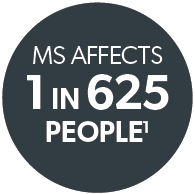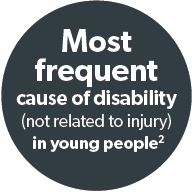



What causes MS?
MS is an autoimmune disorder, which means that your immune system mistakenly attacks parts of your body.2 In MS, this attack takes place on the protective sheath (myelin) that covers the nerve fibres. The damage caused by the immune system interrupts communication between your brain and the rest of your body. Over time, the damage and deterioration of the nerves becomes permanent.3
There are some factors that might increase someone’s chance of getting MS.2 We can break these down into environmental factors, or things that someone may encounter or be in contact with during their life, and genetic factors, which are things that you are born with.
Environmental factors2,3
The symptoms of MS are different from person to person, and not everyone with MS will experience all of these symptoms:3
- Infections – certain viruses, such as the Epstein Barr virus are associated with MS
- Climate – MS is more common in countries with temperate climates (those countries furthest from the equators), such as Canada, the northern United States, New Zealand, south-eastern Australia and Europe
- Vitamin D – there is a link between low vitamin D levels, low amounts of sunlight and MS
- Autoimmune diseases – you may have a slightly higher risk of developing MS if you have another autoimmune condition such as thyroid disease, pernicious anaemia, psoriasis, type 1 diabetes or inflammatory bowel disease
- Smoking – a relapse, or a second occurrence of symptoms, is more likely to occur in people who smoke than people who don’t smoke
Is multiple sclerosis genetic?
There are some genetic factors involved in MS.
- It is thought that more than 200 genes may be involved in some way4
- MS is not thought to be inherited or passed on by your parents. However there is a higher chance of getting the disease if someone in your immediate family has it.1 For example, children of people with MS have a 1 in 48 chance of getting MS in their lifetime, whereas nieces and nephews have a 1 in 100 chance.1
Multiple sclerosis (MS) life expectancy
MS itself is not usually fatal, however complications from severe MS, such as infections or swallowing difficulties may cause death. On average, multiple sclerosis life expectancy is 5 to 10 years less than for people without MS, and this gap is getting smaller.5
EXPLORE ON THIS SITE
References:
- O'Gorman C, et al. Neuroepidemiology 2013;40(1):1-12.
- Kamm C , et al. Eur Neurol 2014;72:132-141.
- Mayo Clinic. Multiple sclerosis – symptoms and causes. https://www.mayoclinic.org/diseases-conditions/multiplesclerosis/symptoms-causes/syc-20350269 (last updated 12 June 2020).
- MS Research Australia. The role of genes in MS. https://msra.org.au/news/role-genes-ms/ (date of last update not specified).
- National Health Service. Overview: Multiple sclerosis. https://www.nhs.uk/conditions/multiple-sclerosis/(last updated 20 December 2018).